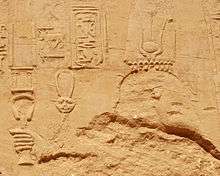Cleopatra I Syra
| Cleopatra I Syra | |||||||||||||||||||||||||||||||
|---|---|---|---|---|---|---|---|---|---|---|---|---|---|---|---|---|---|---|---|---|---|---|---|---|---|---|---|---|---|---|---|
Queen of Egypt
| |||||||||||||||||||||||||||||||
 | |||||||||||||||||||||||||||||||
| Born | c. 204 BC | ||||||||||||||||||||||||||||||
| Died | 176 BC[2] or 178/177 BC[3] | ||||||||||||||||||||||||||||||
| Spouse | Ptolemy V of Egypt | ||||||||||||||||||||||||||||||
| Issue |
Ptolemy VI of Egypt Ptolemy VIII Physcon Cleopatra II of Egypt | ||||||||||||||||||||||||||||||
| Dynasty | Ptolemaic | ||||||||||||||||||||||||||||||
| Father | Antiochus III the Great | ||||||||||||||||||||||||||||||
| Mother | Laodice III | ||||||||||||||||||||||||||||||
Cleopatra I Syra (Greek: Κλεοπάτρα Σύρα; c. 204 – 176 BC) was a princess of the Seleucid Empire, Queen of Ptolemaic Egypt by marriage to Ptolemy V of Egypt, and regent of Egypt during the minority of their son, Ptolemy VI, from her husband’s death in 180 BC until her own death in 176 BC.
Life
Cleopatra I was the daughter of Antiochus III the Great, King of the Seleucid Empire, and Queen Laodice III.
Queen
In 197 BC, Antiochus III had captured a number of cities in Asia Minor previously under the control of the Ptolemaic kingdom of Egypt. The Romans supported the Egyptian interests, when they negotiated with the Seleucid king in Lysimachia in 196 BC. In response, Antiochus III indicated his willingness to make peace with Ptolemy V and to have his daughter Cleopatra I marry Ptolemy V. They were betrothed in 195 BC and their marriage took place in 193 BC in Raphia.[4] At that time Ptolemy V was about 16 years and Cleopatra I about 10 years old. Later on, Egypt's Ptolemaic kings were to argue that Cleopatra I had received Coele-Syria as her dowry and, therefore, this territory again belonged to Egypt. It is not clear if this was the case. However, in practice, Coele-Syria remained a Seleucid possession after the Battle of Panium in 198 BC.[5]
In Alexandria, Cleopatra I was called the Syrian.[6] As part of the Ptolemaic cult she was honoured with her husband as Theoi Epiphaneis. In line with ancient Egyptian tradition, she was also named adelphe (= sister) of Ptolemy V. A synod of priests held at Memphis in 185 BC transferred all honours that Ptolemy V had received in 196 BC (written on the Rosetta stone) to his wife. In 187 BC, Cleopatra I was appointed vizier.
Regent
Upon her husband's death in 180 BC, she ruled on behalf of her young son, Ptolemy VI. She was the first Ptolemaic queen to rule without her husband. This can be concluded from date formulas on the papyri written in the years from 179 BC to 176 BC, where Cleopatra I is called Thea Epiphanes and her name is written before that of her son. She also minted her own coins, which also bear her name before that of her son.
On June 22, 2010, archaeologists uncovered a gold coin bearing her image at Tel Kedesh in Israel near the Lebanon border. It was reported to be the heaviest and most valuable gold coin ever found in Israel.[7]
Just before his death, Ptolemy V had planned to conduct a war against the Seleucid kingdom but when Cleopatra I became sole ruler, she immediately ended the war preparations directed against her brother Seleucus IV Philopator.
Cleopatra I died around 176 BC. The year after her death, her son Ptolemy VI and her daughter Cleopatra II married.
Issue
She and Ptolemy V had at least three children:[8][9]
- Ptolemy VI born in 186 BC
- Cleopatra II born ca 187 – 185 BC
- Ptolemy VIII born ca 184 BC
Ancestry
| Ancestors of Cleopatra I Syra | ||||||||||||||||||||||||||||||||||||||||||||||||||||||||||||||||||||||||||||||||||||||||||||||||||||||||||||||||||||||||||||||||||||||||||||||||||||||||||||||||||||||||||||||||||||||||||||||||||||||||||||||||||||||||||||||||||||||||||||||||||||||||||||||||||||||||||||||||||||||||||||||||||||||||||||||||||||||||||||||||||||||||||||||||||||||||||||||||||||||||||||||||||||||||||||||||||||||||||||||||||||||||||||||||||||||||||||||||||||||||||||||||||||||||||||||||||||||||||||||||||||||||||||||||||||||||||||||||||||||||||||||||||||||||||||||||||||||||||||||||||||||||||||||||
|---|---|---|---|---|---|---|---|---|---|---|---|---|---|---|---|---|---|---|---|---|---|---|---|---|---|---|---|---|---|---|---|---|---|---|---|---|---|---|---|---|---|---|---|---|---|---|---|---|---|---|---|---|---|---|---|---|---|---|---|---|---|---|---|---|---|---|---|---|---|---|---|---|---|---|---|---|---|---|---|---|---|---|---|---|---|---|---|---|---|---|---|---|---|---|---|---|---|---|---|---|---|---|---|---|---|---|---|---|---|---|---|---|---|---|---|---|---|---|---|---|---|---|---|---|---|---|---|---|---|---|---|---|---|---|---|---|---|---|---|---|---|---|---|---|---|---|---|---|---|---|---|---|---|---|---|---|---|---|---|---|---|---|---|---|---|---|---|---|---|---|---|---|---|---|---|---|---|---|---|---|---|---|---|---|---|---|---|---|---|---|---|---|---|---|---|---|---|---|---|---|---|---|---|---|---|---|---|---|---|---|---|---|---|---|---|---|---|---|---|---|---|---|---|---|---|---|---|---|---|---|---|---|---|---|---|---|---|---|---|---|---|---|---|---|---|---|---|---|---|---|---|---|---|---|---|---|---|---|---|---|---|---|---|---|---|---|---|---|---|---|---|---|---|---|---|---|---|---|---|---|---|---|---|---|---|---|---|---|---|---|---|---|---|---|---|---|---|---|---|---|---|---|---|---|---|---|---|---|---|---|---|---|---|---|---|---|---|---|---|---|---|---|---|---|---|---|---|---|---|---|---|---|---|---|---|---|---|---|---|---|---|---|---|---|---|---|---|---|---|---|---|---|---|---|---|---|---|---|---|---|---|---|---|---|---|---|---|---|---|---|---|---|---|---|---|---|---|---|---|---|---|---|---|---|---|---|---|---|---|---|---|---|---|---|---|---|---|---|---|---|---|---|---|---|---|---|---|---|---|---|---|---|---|---|---|---|---|---|---|---|---|---|---|---|---|---|---|---|---|---|---|---|---|---|---|---|---|---|---|---|---|---|---|---|---|---|---|---|---|---|---|---|---|---|---|---|---|---|---|---|---|---|---|---|---|---|---|---|---|---|---|---|---|---|---|---|---|---|---|---|---|---|---|---|---|---|---|---|---|---|---|---|---|---|---|---|---|---|---|---|---|---|---|---|---|---|---|---|---|---|---|---|---|---|---|---|---|---|---|---|---|---|---|---|---|---|---|---|---|---|---|---|---|---|---|---|---|---|---|---|---|---|---|---|---|---|---|---|---|---|---|---|---|---|---|---|---|---|---|---|---|---|---|---|---|---|---|---|---|---|---|---|---|---|---|---|
| ||||||||||||||||||||||||||||||||||||||||||||||||||||||||||||||||||||||||||||||||||||||||||||||||||||||||||||||||||||||||||||||||||||||||||||||||||||||||||||||||||||||||||||||||||||||||||||||||||||||||||||||||||||||||||||||||||||||||||||||||||||||||||||||||||||||||||||||||||||||||||||||||||||||||||||||||||||||||||||||||||||||||||||||||||||||||||||||||||||||||||||||||||||||||||||||||||||||||||||||||||||||||||||||||||||||||||||||||||||||||||||||||||||||||||||||||||||||||||||||||||||||||||||||||||||||||||||||||||||||||||||||||||||||||||||||||||||||||||||||||||||||||||||||||
Notes
- ↑ Beckerath, J. Handbuch der Ägyptischen Königsnamen, MÄS 49 (1999): 289
- ↑ Werner Huß, Ägypten in hellenistischer Zeit (Egypt in Hellenistic times). Munich 2001, p. 540
- ↑ Cleopatra I by Chris Bennett
- ↑ Polybius 18.51.10 and 28.20.9; Livy 33.40.3 and 35.13.4; Appian, Syriaca 3.13 and 5.18
- ↑ Polybius 28.1.2-3 and 28.20.6-10; Josephus, Antiquities of the Jews 12.154-155; Appian, Syriaca 5.18
- ↑ Appian, Syriaca 5.18
- ↑ Israel finds rare 2,200-year-old gold coin. Retrieved 11 August 2010.
- ↑ Aidan Dodson, Dyan Hilton, The Complete Royal Families of Ancient Egypt, 2004
- ↑ Cleopatra I by Chris Bennett
- ↑ Laodice III, prior to her marriage to Antiochus III the Great, was a Princess of Pontus and was styled as such.
Cleopatra I Syra Born: 204 BC Died: 176 BC | ||
| Preceded by Ptolemy V |
Ptolemaic dynasty 193 BC–176 BC with Ptolemy V and Ptolemy VI |
Succeeded by Ptolemy VI Philometor |
References
- Stähelin, Kleopatra 14). In: Realencyclopädie der Classischen Altertumswissenschaft, vol. XI 1, 1921, col. 738-740.
- Werner Huß, Ägypten in hellenistischer Zeit (Egypt in the Hellenistic Period). Munich 2001, p. 499; 514f.; 535; 537-540.
- Günther Hölbl, Geschichte des Ptolemäerreichs (History of the Ptolemaic Empire). Darmstadt 1994, p. 125; 127f.; 147f.; 153.
